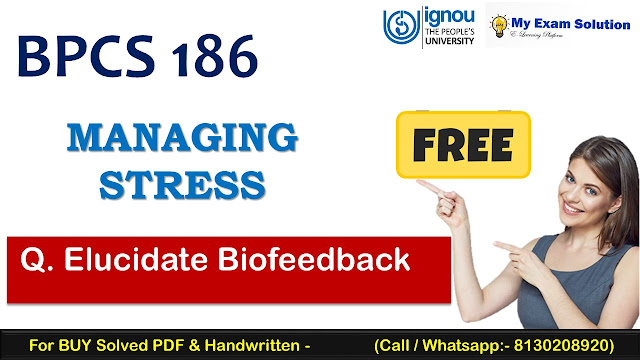Elucidate Biofeedback
In today's fast-paced and demanding world, stress has become a common experience for many individuals. Managing stress effectively is crucial for maintaining overall well-being and preventing the negative impact it can have on physical and mental health.
Biofeedback is a
technique that has gained popularity as a non-invasive and drug-free approach
to stress management. It allows individuals to gain awareness and control over
physiological processes by providing real-time feedback.
Elucidate Biofeedback-Biofeedback is a therapeutic technique that enables individuals to learn how to regulate their physiological functions consciously. It involves using electronic sensors to monitor and provide real-time feedback on various physiological parameters, such as heart rate, skin temperature, muscle tension, and brainwaves.
The feedback is typically presented visually or audibly,
allowing individuals to observe and interpret their body's responses. By
receiving immediate feedback, individuals can learn to control and modify their
physiological responses, leading to improved self-regulation.
Also Read-
- Describe Various Steps Involved In Problem Solving
- Explain Conflict Resolution With A Focus On Its Strategies
- Explain The Various Barriers To Comminution And Describe How These Barriers Can Be Dealt With Effectively
1. The Stress Response and Biofeedback: Stress triggers a physiological response known as the "fight-or-flight" response, involving increased heart rate, elevated blood pressure, muscle tension, and changes in breathing patterns. These physiological changes are automatic and often occur unconsciously. Biofeedback helps individuals become aware of these responses and learn techniques to modulate them.
By monitoring physiological parameters during stressful
situations, individuals can identify their stress triggers and develop strategies
to effectively manage them.
Types
of Biofeedback Techniques:
There are various types of
biofeedback techniques used to manage stress. Some commonly utilized approaches
include:
A. Electromyography (EMG)
Biofeedback: This technique measures muscle tension and helps individuals
identify and control excessive muscle contractions associated with stress and
anxiety. By learning to relax specific muscle groups, individuals can reduce
tension and promote relaxation.
B. Heart Rate Variability (HRV)
Biofeedback: HRV biofeedback measures the time interval between heartbeats,
providing insights into the body's autonomic nervous system functioning. By
achieving a balanced and coherent heart rate pattern, individuals can promote
relaxation and reduce stress.
C. Thermal Biofeedback: Thermal
biofeedback measures skin temperature, which can be influenced by stress and
anxiety. By learning to increase peripheral blood flow and warm the hands,
individuals can promote relaxation and reduce stress levels.
D. Neurofeedback
(Electroencephalography, EEG): Neurofeedback monitors brainwave activity and
provides feedback on the brain's electrical patterns. It helps individuals gain
control over their brainwaves, promoting relaxation, focus, and emotional
regulation.
Benefits
of Biofeedback for Stress Management:
Biofeedback offers several benefits
for stress management and overall well-being:
A. Increased Self-Awareness:
Biofeedback provides real-time information about physiological responses,
allowing individuals to become more aware of their body's reactions to stress.
This awareness empowers individuals to recognize early signs of stress and take
proactive steps to manage it effectively.
B. Stress Reduction: By learning
self-regulation techniques through biofeedback, individuals can actively reduce
their stress levels. The ability to control physiological responses, such as
muscle tension or heart rate, promotes relaxation and enhances the body's
natural stress response.
C. Improved Coping Skills:
Biofeedback equips individuals with practical skills and strategies for
managing stress. By learning to modulate physiological responses, individuals
develop adaptive coping mechanisms that can be applied in various stressful
situations.
D. Enhanced Emotional Regulation:
Biofeedback techniques, such as neurofeedback, can help individuals regulate
their brainwave patterns and enhance emotional regulation. This can be
particularly beneficial for individuals experiencing anxiety, depression, or
other emotional challenges.
E. Non-Invasive and Drug-Free:
Biofeedback is a non-invasive and drug-free approach to stress management,
making it suitable for individuals seeking natural alternatives or those who
prefer to avoid medication.
F. Long-Term Benefits: With regular
practice, individuals can integrate the skills learned through biofeedback into
their daily lives. This leads to lasting effects and the ability to manage
stress effectively beyond the biofeedback sessions.
Integration
with Mindfulness and Relaxation Techniques:
Biofeedback can be effectively
integrated with mindfulness and relaxation techniques to enhance stress
management. Mindfulness practices cultivate present-moment awareness and
non-judgmental acceptance of one's experiences, including stress. By combining
biofeedback with mindfulness techniques, individuals can amplify their
self-awareness, focus, and relaxation skills, leading to more effective stress
reduction.
Professional Guidance and Training:
While biofeedback techniques can be self-administered to some extent,
professional guidance and training are beneficial for optimal results. Working
with a trained biofeedback practitioner provides individuals with personalized
feedback, guidance, and support throughout the process. A practitioner can
tailor the biofeedback training to individual needs, set realistic goals, and
address any challenges or concerns that may arise.
Biofeedback offers a valuable tool for managing stress and promoting overall well-being. By providing real-time feedback on physiological responses, individuals can learn to regulate their body's reactions to stress consciously. The ability to modulate muscle tension, heart rate, brainwave patterns, and other physiological parameters promotes relaxation, emotional regulation, and adaptive coping skills.
Elucidate Biofeedback-As a non-invasive
and drug-free approach, biofeedback can be integrated with mindfulness and
relaxation techniques, enhancing its effectiveness in stress management. With
professional guidance and regular practice, individuals can develop long-term
skills for stress reduction, leading to improved quality of life and enhanced
well-being.







0 comments:
Note: Only a member of this blog may post a comment.